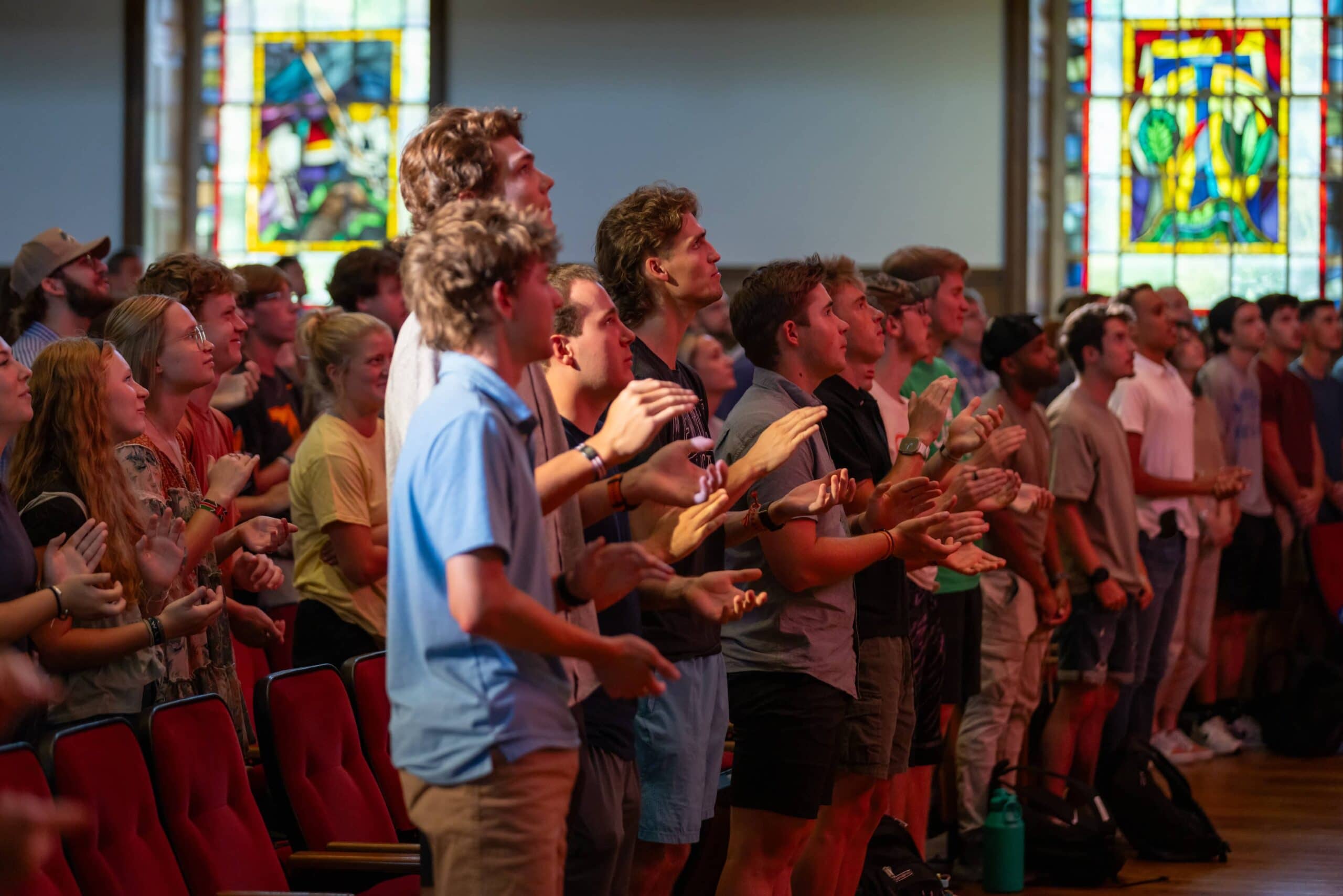A Counseling Degree Built on Faith, Learning, and Service
Milligan’s graduate Counseling program prepares students to become skilled professionals with empathy and integrity. Small class sizes foster meaningful connections with faculty and peers, while expert instructors bring real-world experience to tie theory to practice. Through internships and collaborations with local organizations, hands-on learning ensures that students gain practical experience and are well-prepared for counseling roles.
SCHOOL OF SOCIAL SCIENCES & EDUCATION
MASTER OF SCIENCE IN COUNSELING (MSC)
Career Paths in Counseling
Milligan’s Counseling program graduates are well-equipped to pursue rewarding careers in various fields, including mental health services, school counseling, community mental health services, private practice, residential treatment facilities, school counseling, and other settings requiring a masters degree in Counseling. The degree prepares graduates to pursue licensure as professional counselors in the state of TN and many other states.
Potential Careers
Mental Health Counselor
School Counselor
Support academic, personal, and career development for students.
Substance Abuse Counselor
Provide assistance and strategies for overcoming addiction.
Marriage and Family Therapist
Behavioral Therapist
Develop interventions for clients to improve daily functioning.
Clinical Case Manager
Coordinate care and resources for individuals with mental health needs.
Accreditation
The Clinical Mental Health Counseling program (MSC) at Milligan University is accredited by The Council for Accreditation of Counseling and Related Educational Programs (CACREP) (1001 North Fairfax St, Suite 510, Alexandria, VA 22314; 703.535.5990).
The School Counseling (MSC) program is accredited by the Council for the Accreditation of Educator Preparation (CAEP) (2010 Massachusetts Ave. NW, Washington, DC 20036; 202.466.7496).


Counseling Center
The Milligan Counseling Center offers counseling services for the health and well-being of our campus community and provides an internship or practicum experience for Master of Science Counseling students.
Mission
Milligan’s Master of Science in Counseling will prepare graduates to demonstrate excellence as servant leaders in professional counseling.
Program Objectives:
- Students demonstrate excellence in professional counseling knowledge and skills and advance to candidacy. (short-term objective)
- Students complete the program, begin professional careers, and obtain professional licensure. (mid-term objective)
- Alumni are successful by being LPCs in good standing, becoming site supervisors, and taking on leadership roles in professional and large communities, often after earning a degree in counseling. (long-term objective)
Schedule
Most classes are scheduled in late afternoons and evenings, with occasional day and weekend requirements (professional field experiences require day commitments). The CMHC program consists of six full semesters, including two summer sessions. You can complete the program in two years or at a slower pace as class offerings allow. A new class of students enrolls each fall semester and follows a fall-spring-summer rotation, finishing after the second summer. Courses meet on the main campus of Milligan University in Northeast Tennessee, and some courses have an online or hybrid format.
The SC program consists of five full semesters, including one summer session, preparing students for various types of counseling roles. You can complete the program in 21 months or at a slower pace as classes are offered. A new class of students enrolls each fall semester and follows a fall-spring-summer rotation, finishing after the second spring semester. Courses meet on the main campus of Milligan University in Northeast Tennessee, and some courses have an online or hybrid format. All SC internships must occur in Tennessee, per the Tennessee Department of Education.
Student Success
- 11 students enrolled in CMHC (general & AC); 10 have completed the program to date (6 general CMHC; 4 AC CMHC)—91% completion rate.
- 4 students enrolled in SC; 2 completed program to date – 2 scheduled to complete in Dec.
- 78% completion rate of those who took the NCE in 2023. 100% pass rate of those who took the Praxis II exam in 2023.
- 11 graduates obtained licensure (including temporary licensure) in TN as a professional counselor in 2023-2024.
- 100% employment rate of those seeking employment in the Counseling field (CMHC & SC).
Professional Licensure
Licensed Professional Counselors (LPC)
After completing the Master of Science in Counseling degree and completing a minimum of two years (at least 10 hours per week) of supervised professional experience, graduates are eligible to sit for licensure in Tennessee, Kentucky, North Carolina, and Virginia as a Licensed Professional Counselor. A determination of eligibility has not been made for other states. Reciprocity agreements may allow TN licensure to apply in other states. Students and applicants should check specific state requirements before applying to or enrolling in the program.
For a general overview of the requirements to become a licensed professional counselor, students and applicants are encouraged to visit the ACA Knowledge Center. Students and applicants can click on the following link to find specific state resources and licensing requirements: State Professional Counselor Licensure Boards.
School Counseling
The program prepares graduates to pursue licensure as a school counselor in the state of Tennessee. A determination of eligibility for licensure has not been made in other states. Students and applicants should check specific state requirements before applying to or enrolling in the program.
For a general overview of the requirements to become a licensed school counselor, students and applicants are encouraged to visit the American School Counselor Association. Students and applicants can click on the link from that page to find their specific state licensure requirements for school counselors.
Expectations & Responsibilities
All students at Milligan are expected to uphold the expectations and responsibilities for student lifestyles at Milligan University. Milligan University adopts specific rules on the basis of the belief that God’s Word, as the final rule of faith and practice, speaks on many matters pertaining to personal conduct. Therefore, behavior that conflicts with Scripture is unacceptable. Historically, communities also have developed guidelines that help put into practice basic moral and social principles. Such standards guide one toward worthwhile goals relevant to one’s academic, spiritual, social, and physical well-being.
Students should consult the Student Handbook for further guidance regarding acceptable personal lifestyle and conduct while enrolled at Milligan University. A student’s matriculation and enrollment at Milligan University is their pledge to uphold the policies and expectations outlined in the Student Handbook and Catalog.
Program Evaluation and Vital Statistics
Admission
In order to be considered for admission for this program, the minimum requirements and steps are as follows:
- PREREQUISITES: An undergraduate degree that includes the following prerequisite courses:
- At least 9 hours of psychology courses, including General Psychology, Developmental Psychology, and Research Methods or Statistics
- Computer Competency (3 hrs) (can be fulfilled through documented computer competency)
- DISCOUNTED PRE-REQ COURSES: You might be able to take some prerequisite courses at Milligan at a reduced rate.
- UNDERGRAD DEGREE: Completed baccalaureate degree from a regionally-accredited college with overall undergraduate grade point average of 3.0.
- APPLICATION: Completed application with personal statement. Apply online!
- TRANSCRIPTS: Official transcripts from every college attended whether or not the applicant graduated from that school must be mailed by your college(s) directly to Milligan.
- GRE: The Graduate Record Examination (GRE) is not required if an applicant’s overall undergraduate grade point average is 3.00 or higher. Applicants for whom the GRE is required must score at the 50th percentile or higher. Request that your official GRE scores be sent to Milligan’s Office of Graduate & Professional Studies. Milligan University’s GRE code is 1469.
- REFERENCES: Two professional or educational recommendations will be requested from within the online application.
- INTERVIEW: On-campus interview scheduled for qualified applicants.
- INTERNATIONAL STUDENTS: This program is approved by SEVIS to accept international applicants. International students must complete the application requirements for this program AND the international application requirements and immigration/visa process.
PLEASE RETURN ALL APPLICATION MATERIALS TO:
Office of Graduate & Professional Studies
PO Box 22
Milligan, TN 37682
Please feel free to contact the Office of Graduate & Professional Studies to verify the receipt of the above application requirements. If you have any questions, please contact the University at 800.262.8337 or 423.461.8424 or by email.
The Early Acceptance Program (EAP) provides Milligan undergraduate students with a unique financial and academic opportunity to apply and commit early to the MSC in order to receive lower tuition rates and secure their spot early in the program.
BENEFITS
- Locks in tuition rate
- Secure your spot in the program
- Lighten your course load during the MSC program by taking 1-2 MSC courses as an undergraduate
REQUIREMENTS & PROCESS
- MILLIGAN UNDERGRAD: Be a Milligan undergraduate student (any major eligible; prerequisites are required)
- PARTICIPATION FORM: By fall of junior or senior year, complete and submit (to the GPS Office) the Participation form » for the EAP, which requires approval signatures from both your undergraduate advisor and MSC faculty director
- APPLY TO MSC: Complete the MSC admission process, be admitted, and pay deposit by following deadline in order to lock-in that year’s tuition rate:
-
-
- JUNIORS – by APRIL 15
- SENIORS – by NOV 15
-
- COURSEWORK: Complete the MSC graduate coursework for the Accelerated Plan
-
-
- JUNIORS can take two MSC courses their senior year (one course each semester) in addition to their normal undergraduate course load.
- SENIORS can take one MSC course the spring of their senior year in addition to their normal undergraduate course load.
-
*Approval to declare the Early Acceptance Program is not a guarantee of your admission to the Milligan MSC program.
MSC Faculty
For more information, contact Stacy Shankle, Admissions Recruiter for Healthcare Programs
Frequently Asked Questions
What makes Milligan University's Counseling program unique?
Milligan University’s Counseling program combines academic rigor with practical experience, all within a Christian framework, preparing students for a doctoral degree in counseling if they desire. The program fosters a holistic approach to counseling, preparing students to address emotional, psychological, and spiritual needs. Small class sizes provide a supportive learning environment, allowing students to engage directly with caring faculty who bring real-world experience in counselor education to the classroom.
The integration of faith throughout the curriculum offers students a perspective emphasizing compassionate care and ethical decision-making. This foundation empowers graduates to serve their communities with confidence and empathy. Practical experiences, such as internships and practicum placements, ensure that students graduate with the skills and knowledge to thrive in counseling roles. By prioritizing both professional excellence and personal growth, Milligan’s Counseling program equips students to make a meaningful impact in the lives of others.
What concentrations can I choose in this program?
Students in Milligan’s Counseling degree program can select from two concentrations: Clinical Mental Health Counseling (CMHC) and School Counseling (SC). The CMHC track also offers an optional addictions concentration, which provides specialized training to work with individuals overcoming substance use challenges.
These options allow students to tailor their education to align with their career goals. The CMHC concentration prepares students to work in various clinical settings, addressing mental health needs with evidence-based practices. The SC concentration focuses on equipping future counselors to guide students through academic, personal, and career development. This flexibility ensures students can choose a path that best suits their passion and professional aspirations.
How long does it take to complete the program?
The Milligan Counseling program is structured to help students achieve their goals efficiently. The Clinical Mental Health Counseling (CMHC) program takes 24 months to complete, while the School Counseling (SC) program can be finished in 21 months.
Both tracks combine rigorous coursework with hands-on experience, ensuring graduates are well-prepared for their careers. The programs’ timelines are designed with busy students in mind, balancing academic demands with practical training. This efficient structure allows students to transition quickly into their professional roles while maintaining a high standard of education.
Will this program prepare me for licensure?
Yes, Milligan’s Counseling program is designed to meet licensure requirements in most states. Faculty advisors work closely with students to help them understand and navigate the licensure process.
The curriculum covers all coursework and training hours required for graduation and pursuit toward licensure post-graduation, including practicum and internship experiences. Students are encouraged to connect with advisors early in their studies to ensure they meet specific requirements for the state where they plan to practice. This guidance and Milligan’s comprehensive program ensure that graduates are ready to take the next step in their counseling careers.
Are internships or practicum placements required?
Yes, practical experience is a key component of Milligan’s Counseling program. Both concentrations include required practicum and internship placements, which allow students to apply what they’ve learned in real-world settings.
Faculty members assist students in finding placements that align with their interests and career goals. These experiences help students build professional skills, establish connections in the field, and gain confidence in their abilities. From school environments to clinical settings, Milligan ensures that students graduate with the hands-on training to excel in their counseling roles.
Do I need to take the GRE to apply?
The GRE is optional for admission to Milligan’s Counseling program if an applicant has a cumulative undergraduate GPA of 3.00 or higher. This makes the application process more accessible to qualified candidates.
Applicants can demonstrate their academic achievements, professional goals, and passion for the field through their application materials. Milligan values students’ readiness to succeed in the program over standardized test scores, reflecting the university’s commitment to supporting diverse and capable learners.
What financial aid opportunities are available?
Milligan offers a range of financial aid options, including scholarships, assistantships, and other resources to support students in achieving their educational goals. The Counseling master’s degree also benefits from one of the most competitive tuition rates in the region for those pursuing a degree in counseling.
Prospective students are encouraged to connect with Milligan’s financial aid office to explore the resources available to them. Advisors can provide personalized guidance on scholarships, grants, and payment plans to help make the program accessible and affordable. Milligan’s commitment to affordability ensures that students can focus on their education without unnecessary financial stress.












